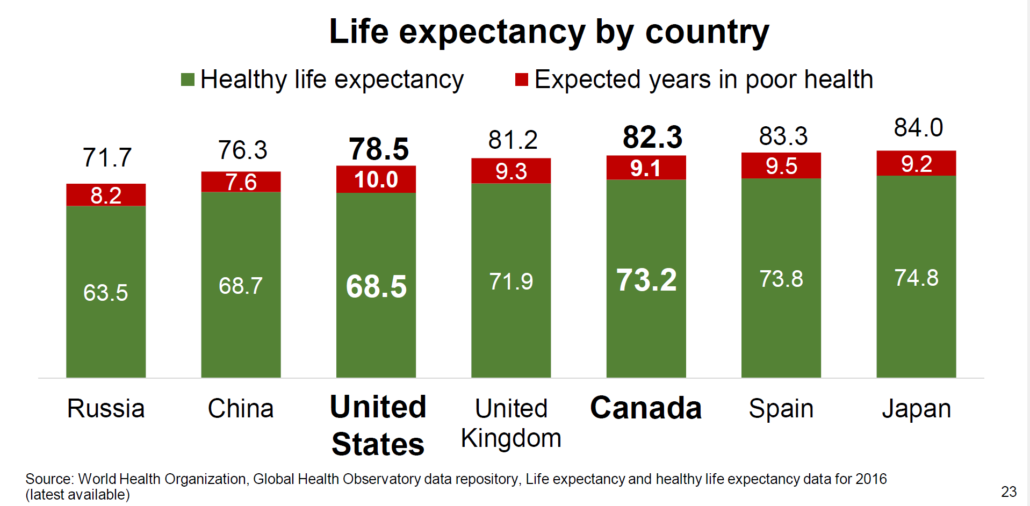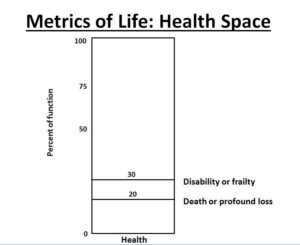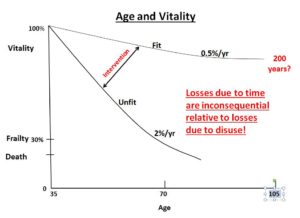Retirement, Entropy, and the Fast Track to Frailty

“The greatest part of human life potential has been wasted by people dying before their allotted time was up.” Peter Laslett
I know I must sound like a broken record. But, I’ll say it again: we western-culture humanoids are notoriously naive about our biologies and live too short and die too long. We, with very few exceptions, start life with a birthright of good health and proceed to teach ourselves, with the help of a culture obsessed with instant gratification and a few highly exploitive industries, how to destroy that birthright.
I’ll invoke, once again, the dismal statistics for how that manifests, citing the WHO data which shows us the worst amongst developed countries in our years of poor health. The U.S. is stuck between Cuba and Panama at #46 out of 193 countries in terms of life expectancy – a stat, by the way, that is going backward in the U.S.

Retirement: Solution? Or part of the problem?
I don’t believe I’m a crowd of one thinking that there is a connection between retirement and this dismal display of unhealthy later years? There is little doubt that much of the foundation for this early and extended journey to frailty began decades earlier with our propensity for poor lifestyle decisions in our youth and in our striving, accumulating years. Unfortunately, the retirement mindset that still prevails isn’t generally conducive to slowing, halting, or reversing these first-half damages. Rather, continued entropy by default would seem to be more prevalent than an attempt to use retirement’s extra time and deeper knowledge to get off this track to early frailty.
Taking risks offsets entropy
We persist in hunkering down knowing that it brings on protracted decay and dependency and leads to living short and dying long. I don’t think that’s what we signed on for at birth but we seem to have allowed ourselves to be taught to head in that direction, unaware of the consequences.
Dr. Walter Bortz, author, and retired Stanford University geriatric physician is one of my favorites sources of experienced-based logic and knowledge in this area. In his book “Dare to Be 100”, he states:
“The best strategy to make long life happen is to take risks. Opportunities for creativity vanish when risk-taking is abandoned. Your aging should have as much creativity left in it as possible. Risk taking increases staying alive until it’s over.”
Much of that risk-taking means going against conventional wisdom, advice, and cultural norms. Avoiding full-stop retirement is one of those.


How’s your “health space” holding up.
I find it helpful to think about my “health space”, that space between 100% of my health (birth?) and only 30% of my health, below which I’m a short time and a few steps from the crematorium. At 79, I know that I have lots of options to keep my percentage as high in that health space as I possibly can. To do that, I have to “intervene” into the generally expected and accepted lifestyle for someone my age and avoid the “hunker-down/wind-down” that can accelerate my inevitable decline. As the Bortz chart above illustrates, my options are to “intervene” and slow the decline or hunker down and accelerate it.
I’m hearing from some readers who aren’t buying the “hunker down” Kool-aid in their retirement years. Check out the comments at the bottom of last week’s article. My 67- year old friend John is sneaking up on 100 pushups in a minute. Jerry L. is a 74-year-old “gym rat” committed to three intense 2-hour workouts a week. Friend and author of “Retirement Heaven or Retirement Hell” Mike Drak retired once and gave it up and is now on a quest to drop big-time weight and participate in a 2021 Ironman competition.
It’s really just about “guts and smarts,”, especially in our later years.
Here’s some additional Bortzian wisdom to ponder:
We get what we set. Life can be thought of as a game, but one that is won by finishing last. It is a struggle and a contest of skills held over time. It can be won or lost, and by big or little scores. But we all live better if we have a game plan. It’s the person who slows down last that wins! Set the destination and the course, know how far you have to go and then don’t slow down.”
Traditional full-stop retirement = entropy = early frailty
It doesn’t make me many friends, but I’ll stand by the above statement. We don’t need to be dying before our allotted time in a country with our resources and knowledge. We can be making more better-informed decisions.





Hello,
No, you are not alone in thinking that retirement contributes to decline. Wondering how the entropy to which you refer plays out across income and type of work? How do these factors impact lifestyle choices? Don’t we need policy and institutional/corporate support to facilitate the kinds of choices that support a long healthy life, one that continues to contribute to society to the end?
Gary,
As Neil Young so succinctly put it: “It’s better to burn out than to fade away”.
Great post.
Regards,
Walt
Great article Gary. I agree with everything that you wrote. I believe approaching retirement without your eyes open is a death trap in disguise.
Great and timely article Gary. I was just thinking about this very topic. I believe the most important job of those retired is to get into the best health they can. Those that maintain their health and fitness have their best years ahead of them. This includes mental, emotional and physical fitness.
On this my birthday its hard for me think about retirement but I can lead a healthy lifestyle that aligns with Gary’s beliefs in taking care of ourselves so we can lead a long creative productive life. Maybe its better to be working longer in a field like mine education which requires mental and creative effort to motivate students to achieve their potential. Thank you Gary for the wonderful post you keep me thinking about my situation.
I like the above quote about taking risks. COVID adversly affected my direct sales business, but I stood by and watched as others on my team continued to excel and promote. I sort of gave up because I told myself I couldn’t do what they do which I mentally know is a lie, but I didn’t take that risk to forge ahead to continue success. But after reading that quote I am ready to take that risk. I have great corporate support and team members at the ready to help along the way.
Thanks for the article
Spot on. Been on this soap box for decades. Its a mindset makeover, and it starts with how we exemplify the aging adult to kids and adolescents, and all those lives that we touch! 👍🏔
Appreciate it for this tremendous post, I am glad I found this website on yahoo.
Hello makeagingwork.com owner, Your posts are always a great source of knowledge.
To the makeagingwork.com administrator, Good work!
Hi makeagingwork.com administrator, Keep it up!
Hello makeagingwork.com administrator, Great job!
Hello makeagingwork.com owner, Your posts are always well presented.
Dear makeagingwork.com owner, Thanks for the well-organized and comprehensive post!
Hello makeagingwork.com administrator, Your posts are always well-referenced and credible.
To the makeagingwork.com owner, Your posts are always a great source of information.
Hi makeagingwork.com admin, Thanks for the well-organized and comprehensive post!
To the makeagingwork.com webmaster, Thanks for the in-depth post!
Hi makeagingwork.com administrator, Your posts are always well-balanced and objective.
Dear makeagingwork.com owner, Keep up the good work, admin!
To the makeagingwork.com admin, Your posts are always well-received by the community.
Hello makeagingwork.com admin, Your posts are always well-written and engaging.
To the makeagingwork.com owner, Thanks for the well-organized post!